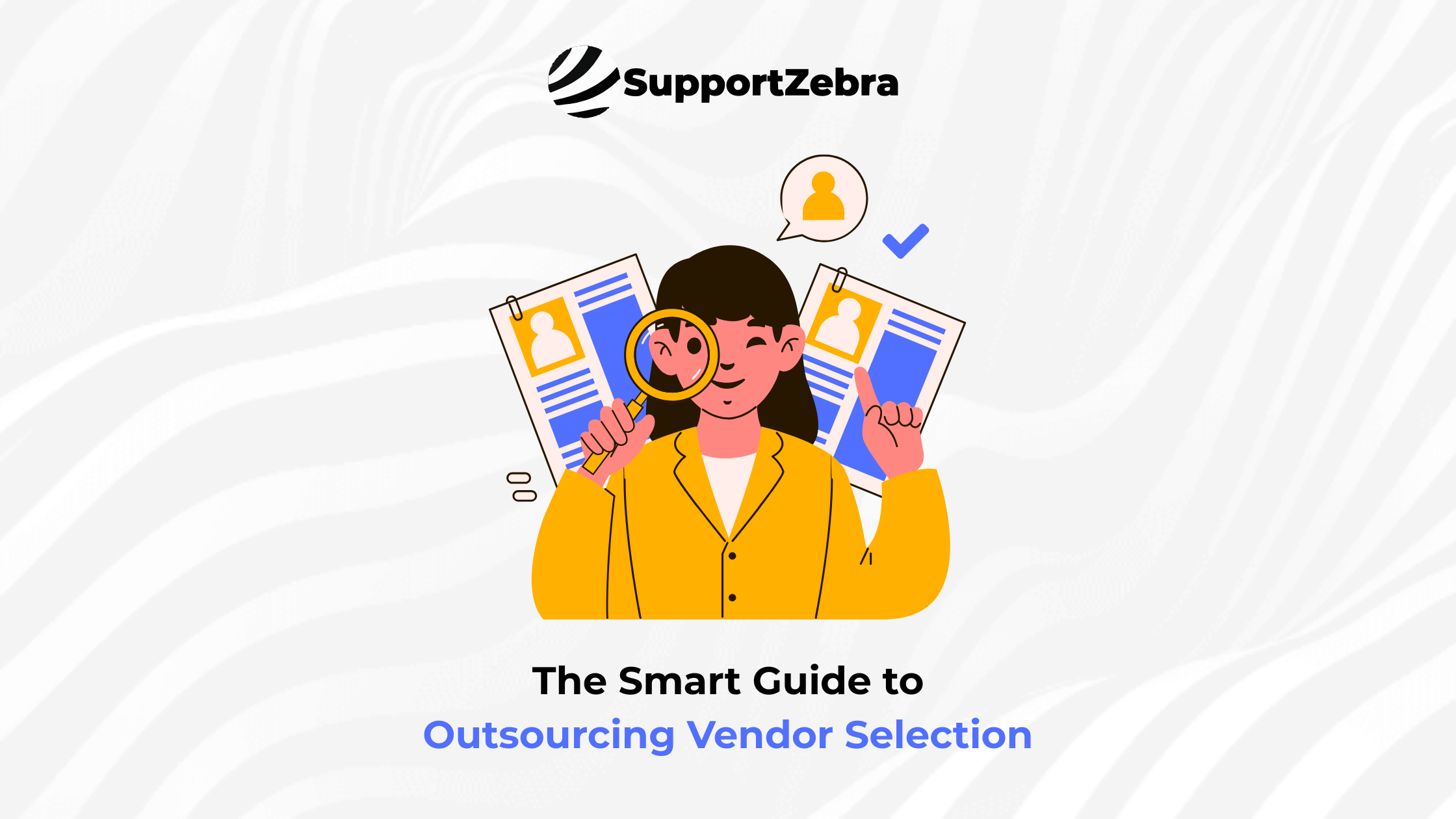Your Guide to Picking the Best Outsourcing Partner
Key Takeaways:
- Successful outsourcing starts with clear goals, defined criteria, and thorough vendor research.
- Key factors like expertise, reputation, security, and cultural fit determine the right partner.
- Strong vendor relationships rely on open communication, trust, and aligned values.
- SupportZebra helps businesses save costs and scale with secure, reliable outsourcing solutions.
Choosing the right vendor for outsourcing is like creating a strategic plan for any business. It’s crucial to carefully select vendors when investing millions in outsourcing projects. Companies can reduce risks and get the most out of their outsourcing relationships by considering factors like cost, delivery time, and quality.
In this blog, we will explore the different factors to consider when selecting an outsourcing vendor, as well as best practices and common pitfalls to avoid.
The Ideal Vendor Selection Process
Building strong business relationships starts with selecting the right vendor. It’s not just about price or location; it’s about finding a partner aligned with your goals. Here’s a streamlined approach:
- Define Your Outsourcing Objectives
Outline your goals to ensure they align with your company’s objectives, addressing what to outsource, expected costs, productivity, and team impact.
- Establish Vendor Selection Criteria
Set specific standards based on your goals, focusing on expertise, technology, pricing flexibility, communication, security, and client feedback.
- Do Your Research
Explore local and international vendors for competitive pricing and a broader talent pool.
- Request Proposals and Evaluate
Ask top vendors for proposals and use an evaluation matrix to score them against your criteria.
- Evaluate Cultural Fit
Interview leading vendors to assess their skills and compatibility with your company culture using case studies and open-ended questions.
- Perform Due Diligence
Verify vendor claims, check references, and assess financial health to reduce risks.
- Negotiate and Finalize Agreements
Once a vendor is chosen, negotiate contract terms, including pricing, service levels, security, and exit strategies, consulting legal experts to protect your interests.
Factors to Consider When Selecting a Vendor
When choosing an outsourcing partner, consider these key factors for a successful partnership:
- Expertise
Ensure the vendor has the necessary skills, especially for technical roles. Speak with the technical lead to assess their capabilities.
- Business Mindset
Evaluate the vendor’s customer service approach, as excellent technology is ineffective without good support.
- Reputation
Research client reviews and testimonials to gauge customer satisfaction.
- Budget Management
Adhere to your budget while ensuring quality. Be wary of vague agreements or hidden fees.
- Data Protection
Ensure the vendor respects your privacy and intellectual property by having them sign a non-disclosure agreement (NDA).
- Industry Knowledge
Assess the vendor’s experience in your industry and their history of successful projects.
- Deadline Reliability
Confirm their ability to consistently meet deadlines by reviewing their track record.
Building A Strong Relationship With Your Vendor
After exploring the details of selecting a vendor and pinpointing essential factors to remember during the selection process, knowing how to build a strong relationship with the vendor you choose is crucial. From fostering open communication and setting clear expectations to nurturing mutual trust and collaboration, each element contributes to the foundation of a successful partnership.
- Clear Communication
Maintain open communication to ensure transparency and efficiency. Regularly update vendors on your plans and areas for improvement, using collaboration tools and meetings to strengthen connections.
- Treat Vendors as Allies
Involve vendors in key decisions and recognize their expertise. Viewing them as partners fosters trust and encourages collaboration.
- Select Aligned Vendors
Choose vendors whose values align with yours for better understanding and smoother interactions.
- Make Timely Payments
Pay vendors on time to show respect for their services and maintain a positive relationship.
- Create Win-Win Opportunities
Align your goals with your vendors, sharing insights and resources for mutual benefit.
- Encourage Open Communication
Promote open discussions and take responsibility for any issues, fostering accountability and trust.
- Identify and Manage Risks
Monitor potential risks and collaborate with vendors to address them, strengthening your relationship through effective risk management.
Common Outsourcing Pitfalls to Avoid
Outsourcing can be beneficial for reducing workload and saving money, but poor management can lead to serious issues. Here are common mistakes to avoid:
- Lack of Planning
A solid plan is essential for successful outsourcing. Create a detailed strategy and monitor progress.
- Ignoring Cultural Differences
Be aware of cultural differences and time zones to prevent misunderstandings and enhance teamwork.
- Picking the Wrong Vendor
Assess vendors based on location, skills, resource management, quality, and financial health to find the right fit.
- Poor Communication
Establish clear communication channels and guidelines to avoid confusion and ensure smooth operations.
- Weak Data Security
Prioritize data security to prevent breaches and protect your reputation. Ensure vendors follow strict protocols.
- Quality Issues
Clearly define quality expectations to align with business goals and avoid disappointments.
- Hidden Costs
Outline project requirements, timelines, and pricing upfront to avoid unexpected expenses.
- Data Security
Implement strong practices to safeguard sensitive information.
- Delegation Challenges
Build trust and maintain clear communication to ensure a smooth partnership when handing off tasks.
SupportZebra as Your Outsourcing Vendor
Choosing the right outsourcing partner with a solid plan can yield significant benefits, including cost savings, increased efficiency, and access to specialized skills. A strategic outsourcing approach enables companies to adapt to market changes, improve resilience, and foster innovation. To avoid pitfalls like poor planning and communication, it’s crucial to set clear objectives, conduct thorough research, and build strong vendor relationships.
At SupportZebra, we help SaaS and eCommerce businesses grow through tailored outsourcing solutions, offering customer support and back-office operations that can save companies up to 50%. Our experienced, English-speaking team provides high-quality service, technical assistance, and secure data management with strict privacy protocols.
Partnering with SupportZebra ensures exceptional service and peace of mind. Contact us today to discover how we can customize our solutions to enhance your business.

